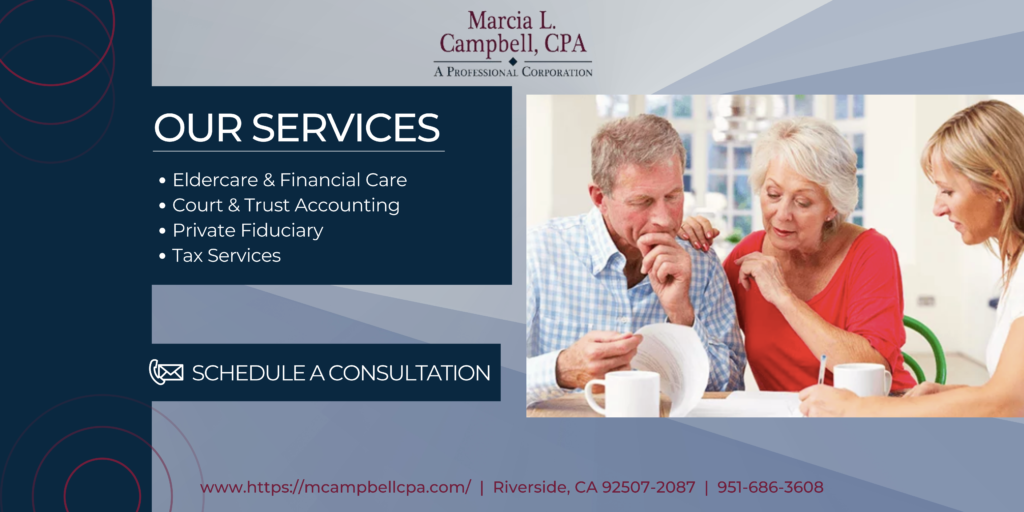A trust is the culmination of a person’s life and legacy, and in many ways, a trust accounting is the continuation of that story. An accounting is an essential form of protection for beneficiaries and trustees alike, and in California, trustees have a legal obligation to prepare one. Many people have questions about how to do trust accounting in California. An accounting must be accurate, compliant, and include specific pieces of information.
At Marcia L. Campbell, we have helped trustees prepare accurate and compliant accountings for decades to avoid costly penalties and litigation. Learn more about how to prepare one and why it is essential to work with a professional trust accountant in our blog.
Related Article: What is the Purpose of a California Trust Accounting?
How to Do Trust Accounting in California
When you prepare an accounting, there are several moving parts. From ensuring it includes all the right information to ensuring it is compliant with probate law, it can be difficult to understand what this process entails. Read on to learn the basics of trust accounting.
“When you author the story of the trust and the legacy of the person who left it behind, like with all stories, the details and facts matter. California probate code has specific requirements that you must satisfy to ensure that your accounting is acceptable and doesn’t make you vulnerable to litigation. The stakes are high for trustees, which is why working with a professional is often essential.” – Marcia L. Campbell, one of the leading trust accountants in California
Related Article: What is the Penalty for an Inaccurate Trust Accounting?
What Are Basics When Preparing an Accounting for Trusts?
Basic principles are important to understand when determining how to do trust accounting in California. A trust accounting, essentially, is bookkeeping required for trusts. Per California probate code sections 16060 and 16062, trustees must:
- Keep beneficiaries ‘reasonably’ informed about how they manage the trust.
- Provide an accounting at least once annually.
- Provide an accounting at the termination of a trust or when a trustee changes.
Trustees also must prepare an accounting for beneficiaries when they request one within 60 days. Trust terms determine how often trustees must prepare an accounting. Depending on the trust document, they may be required to prepare one more or less frequently.
An accounting should include information about assets in the trust, how the trustee has used them, any funds or assets that have entered or left the trust, and all financial transactions related to the trust.
Related Article: How Do You Know if a Trust Accounting is Accurate?
What Should a California Trust Accounting Include?
It is essential to understand what you should include in this record when learning how to do trust accounting in California.
Per California probate code section 16063, an accounting should include the following information for the last fiscal year of the trust or the time since a trustee last prepared and provided accounting:
- A statement of all receipts and disbursements of principal and income
- A statement of assets and liabilities
- A statement of the trustee’s compensation
- The agents hired by the trustee, their role, their relationship to the trustee, and what the trustee is paying them
- A statement that beneficiaries can petition to obtain a court review of the account and the acts of the trustee
- A statement that beneficiaries cannot make claims against the trustee for breach of their fiduciary duties after three years from the date of receipt
When preparing a California trust accounting, all of these items must also comply with California probate code section 1061. Per this section, you must include a summary of:
- Property on hand at the beginning of the period covered by the account
- The value of assets received during a period
- The amount of any receipts of income or principal
- Net income and losses from a trade or business
- Gains and losses on sales
- Amount of disbursements (not including those for a trade or business)
- Distributions to the beneficiaries
- Property on hand at the end of the period
Related Article: Common Trust Accounting Mistakes to Avoid
Premier CPA Trust Accounting in California
Understanding how to do a trust accounting in California is only part of the battle. Ensuring that your accounting includes all the necessary information and complies with the probate code is crucial to your well-being. But this requires ample experience, expertise, and time. Preparing an accounting is a full-time job, and you already have one of those. So let us help.
At Marcia L. Campbell, CPA, we have provided premier trust accounting services in California for decades. With us, compliance and accuracy are never a question. Visit our contact page and fill out a form to learn about our trust accounting services.



